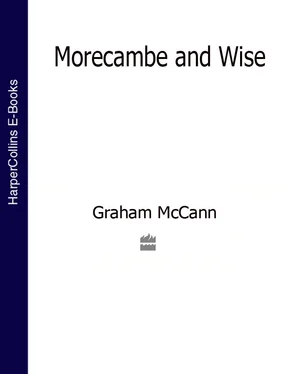Morecambe and Wise were regarded within the BBC at this time as two of Waldman’s protégés, but the irony was that their television career – like their radio career – began only after years of unanswered letters, abortive engagements and innumerable false dawns. They had actually been trying to appear on television since 1948 – the year in which Ernie Wise first resolved to subject the BBC’s television producers and bookings managers to the same kind of remorseless letter-writing campaign that he had already begun to inflict on their radio counterparts. 25On 21 April of that year, in fact, they were invited to an audition at Star Sound Studios near Baker Street in London; the report card has been preserved in the BBC’s archives 26:
MORECAMBE & WISE (Comedy duo)
| DESCRIPTION |
2 young men in ‘Healthy Hank’ & ‘Lingering Death’ make-up. |
| DATE OF AUDITION |
21 April, 1948. |
| PERFORMANCE |
Cross talk, Inkspots impe[rsonation], Vocal finish with ‘dance’ movements. |
| TIME |
8 mins. |
| EXPERIENCE |
Equity. Panto. B[roa]dcast. |
| REMARKS |
Parts of this act might be suitable. Suggestive material & dancing together should be omitted. |
| [SCORE] |
8. |
Although this was judged to have been good enough to warrant a further invitation for a test ‘under normal Television studio conditions, at Alexandra Palace, as soon as possible’, 27nothing came of it as far as actual television appearances were concerned. They did manage a brief appearance on Youth Parade in the autumn of 1951, 28but it was not until Stars at Blackpool, in 1953, and their subsequent encounter with Waldman himself, that their luck really changed for the better.
Had Ronnie Waldman been a less understanding patron, Morecambe and Wise could easily have found themselves ostracised before their television career had really begun. While Waldman, from a discreet distance, was monitoring their development and making tentative plans to sign them up for a series of their own, Frank Pope, their agent, and George Campey, a journalist friend from the London Evening Standard, were allowing themselves to get carried away by their various efforts at publicising the act. Things came to a head when, due to some kind of failure of communication between Pope and Campey, an aggressively pro-Morecambe and Wise article by Campey 29(which practically ordered Waldman to sign them up immediately, and even suggested what their salary should be) appeared several days after Waldman had assured them that he was very close to confirming the series for the 1954 spring schedules. Pope, fearing the worst, wrote to Waldman on 9 November 1953 30– the same day as the appearance of the offending article – explaining that it had all been a most unfortunate mistake and apologising profusely for any embarrassment that might have been caused. Waldman, however, was more amused than angered by the unsolicited advice, and he continued as before with his plans for the series.
Morecambe and Wise had regarded Waldman’s initial offer to them as representing ‘a delirious moment’, 31and they had been young enough and ambitious enough to refuse to be unnerved by the various warnings they received from older performers once the news began to circulate. Ernie Wise recalled:
You will hear old pros tell you that the twenties were the heyday of music-hall, or Variety, as it became known, and that by 1939 it was already dying, that the cinema was killing it. Yet, when we started in 1939, Variety was booming. We believe that if anything killed Variety it was the war when a lot of brilliant acts disappeared and the Palladium embarked on a policy of using only American tops of the bill … [O]n top of that TV was in the ascendancy despite the pundits who scoffed at the new medium. ‘TV will never kill Variety,’ we heard so many say. ‘Who’ll bother to watch a screen when you can see acts live in the theatre?’ 32
The answer, Morecambe and Wise believed, was ‘an increasingly significant number’, and they were determined to make the most of the opportunity they had been handed to be in at the start of an exciting new era. They certainly felt as though they were malleable enough to adapt: they had done so once before, for radio, and saw no reason why they could not now do so again. They appreciated the fact that there was much that needed changing. Morecambe acknowledged that the act they ‘had in music-hall had 15 to 20 minutes of material in it’, which could have been used continuously for years on the circuit (because ‘if a boy saw you doing a sketch when he was 15 he’d usually have completely forgotten it by the time he was 19’ 33). They needed a new one – several new ones, in fact – to satisfy the voracious appetite of television. Between them, they soon came up with a number of ideas – some drawn from personal experience, some from writer friends, and some from the trusted old joke books they carried everywhere with them – and so, when Bryan Sears, their new producer/director, 34arranged to visit them in Sheffield, where they were playing, to commence preliminary discussions, they looked forward to the meeting with more than a little confidence. It proved, however, to have been confidence misplaced.
Ronnie Waldman may well have been in charge of the BBC’s Light Entertainment division, and he may well have believed fervently in breaking down the old cultural barriers that divided the North from the South, but not all of the producers underneath him were inclined to act entirely in accordance with his admirable ideals. Bryan Sears, for one, did not share his superior’s optimism as far as Morecambe and Wise’s future on television was concerned. The first thing that he did after having listened politely to all of their ideas was to tell them that none of them would work ‘down South’. They should be aware, he informed them, that they had a serious problem, and the problem was that they came from the ‘wrong’ part of the country. Both Morecambe and Wise sat open-mouthed as Sears explained that they were unfortunate to be ‘“Northern” comics, [and] that a barrier of prejudice existed separating the North from the South and from Wales, Scotland and Ireland as well’. 35This must have sounded somewhat surprising to performers who only recently had played to large and very appreciative audiences in various parts of London, and whose London-based agent was at that very moment busy responding to numerous requests for return engagements in such places as Bedford, Brighton, Oxford and Norwich. It would have seemed equally fanciful to those in the radio division of the BBCs Variety department who were more eager than ever to offer Morecambe and Wise further opportunities to appear on shows that were broadcast nationally. This, however, was television, and Sears was a television producer, and a good one at that, so they assumed that he must know what was best for them now.
Although one can question his reasoning, one can hardly doubt that Bryan Sears was committed to doing what he felt was most likely to make Morecambe and Wise’s first television series a success. His primary goal, of course, was to produce a good show – rather than to ensure that Morecambe and Wise became stars – but it seemed logical to presume that by doing the former he would probably also be doing the latter. He informed them that they would require a great deal of help if they were to overcome all of the obstacles that were facing them, and that they would therefore need to be ready to make a number of compromises in order to benefit from the support that he and the rest of his production team were willing to offer. Morecambe and Wise agreed, although privately they were now considerably more apprehensive than before.
Читать дальше











![Brian Thompson - A Monkey Among Crocodiles - The Life, Loves and Lawsuits of Mrs Georgina Weldon – a disastrous Victorian [Text only]](/books/704922/brian-thompson-a-monkey-among-crocodiles-the-life-thumb.webp)
